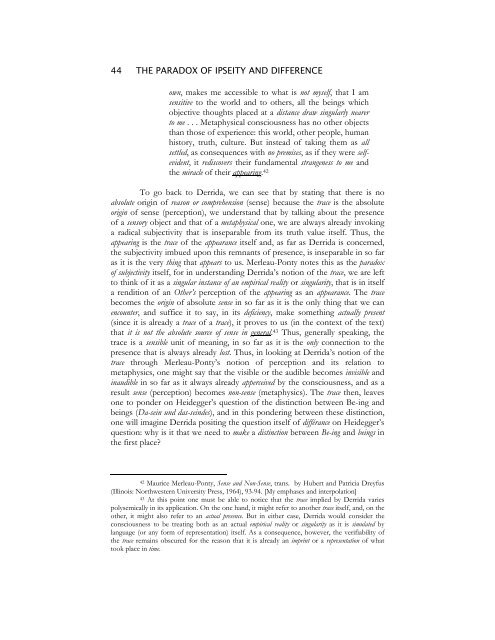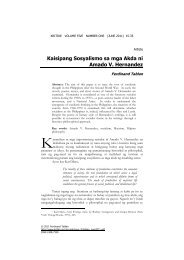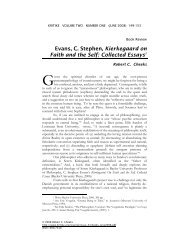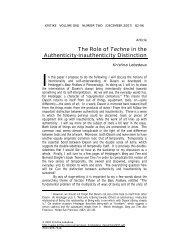The Paradox of Ipseity and Difference: Derrida's Deconstruction and ...
The Paradox of Ipseity and Difference: Derrida's Deconstruction and ...
The Paradox of Ipseity and Difference: Derrida's Deconstruction and ...
Create successful ePaper yourself
Turn your PDF publications into a flip-book with our unique Google optimized e-Paper software.
44 THE PARADOX OF IPSEITY AND DIFFERENCE<br />
own, makes me accessible to what is not myself, that I am<br />
sensitive to the world <strong>and</strong> to others, all the beings which<br />
objective thoughts placed at a distance draw singularly nearer<br />
to me . . . Metaphysical consciousness has no other objects<br />
than those <strong>of</strong> experience: this world, other people, human<br />
history, truth, culture. But instead <strong>of</strong> taking them as all<br />
settled, as consequences with no premises, as if they were selfevident,<br />
it rediscovers their fundamental strangeness to me <strong>and</strong><br />
the miracle <strong>of</strong> their appearing. 42<br />
To go back to Derrida, we can see that by stating that there is no<br />
absolute origin <strong>of</strong> reason or comprehension (sense) because the trace is the absolute<br />
origin <strong>of</strong> sense (perception), we underst<strong>and</strong> that by talking about the presence<br />
<strong>of</strong> a sensory object <strong>and</strong> that <strong>of</strong> a metaphysical one, we are always already invoking<br />
a radical subjectivity that is inseparable from its truth value itself. Thus, the<br />
appearing is the trace <strong>of</strong> the appearance itself <strong>and</strong>, as far as Derrida is concerned,<br />
the subjectivity imbued upon this remnants <strong>of</strong> presence, is inseparable in so far<br />
as it is the very thing that appears to us. Merleau-Ponty notes this as the paradox<br />
<strong>of</strong> subjectivity itself, for in underst<strong>and</strong>ing Derrida’s notion <strong>of</strong> the trace, we are left<br />
to think <strong>of</strong> it as a singular instance <strong>of</strong> an empirical reality or singularity, that is in itself<br />
a rendition <strong>of</strong> an Other’s perception <strong>of</strong> the appearing as an appearance. <strong>The</strong> trace<br />
becomes the origin <strong>of</strong> absolute sense in so far as it is the only thing that we can<br />
encounter, <strong>and</strong> suffice it to say, in its deficiency, make something actually present<br />
(since it is already a trace <strong>of</strong> a trace), it proves to us (in the context <strong>of</strong> the text)<br />
that it is not the absolute source <strong>of</strong> sense in general. 43 Thus, generally speaking, the<br />
trace is a sensible unit <strong>of</strong> meaning, in so far as it is the only connection to the<br />
presence that is always already lost. Thus, in looking at Derrida’s notion <strong>of</strong> the<br />
trace through Merleau-Ponty’s notion <strong>of</strong> perception <strong>and</strong> its relation to<br />
metaphysics, one might say that the visible or the audible becomes invisible <strong>and</strong><br />
inaudible in so far as it always already apperceived by the consciousness, <strong>and</strong> as a<br />
result sense (perception) becomes non-sense (metaphysics). <strong>The</strong> trace then, leaves<br />
one to ponder on Heidegger’s question <strong>of</strong> the distinction between Be-ing <strong>and</strong><br />
beings (Da-sein und das-seindes), <strong>and</strong> in this pondering between these distinction,<br />
one will imagine Derrida positing the question itself <strong>of</strong> différance on Heidegger’s<br />
question: why is it that we need to make a distinction between Be-ing <strong>and</strong> beings in<br />
the first place?<br />
42 Maurice Merleau-Ponty, Sense <strong>and</strong> Non-Sense, trans. by Hubert <strong>and</strong> Patricia Dreyfus<br />
(Illinois: Northwestern University Press, 1964), 93-94. [My emphases <strong>and</strong> interpolation]<br />
43 At this point one must be able to notice that the trace implied by Derrida varies<br />
polysemically in its application. On the one h<strong>and</strong>, it might refer to another trace itself, <strong>and</strong>, on the<br />
other, it might also refer to an actual presence. But in either case, Derrida would consider the<br />
consciousness to be treating both as an actual empirical reality or singularity as it is simulated by<br />
language (or any form <strong>of</strong> representation) itself. As a consequence, however, the verifiability <strong>of</strong><br />
the trace remains obscured for the reason that it is already an imprint or a representation <strong>of</strong> what<br />
took place in time.
















